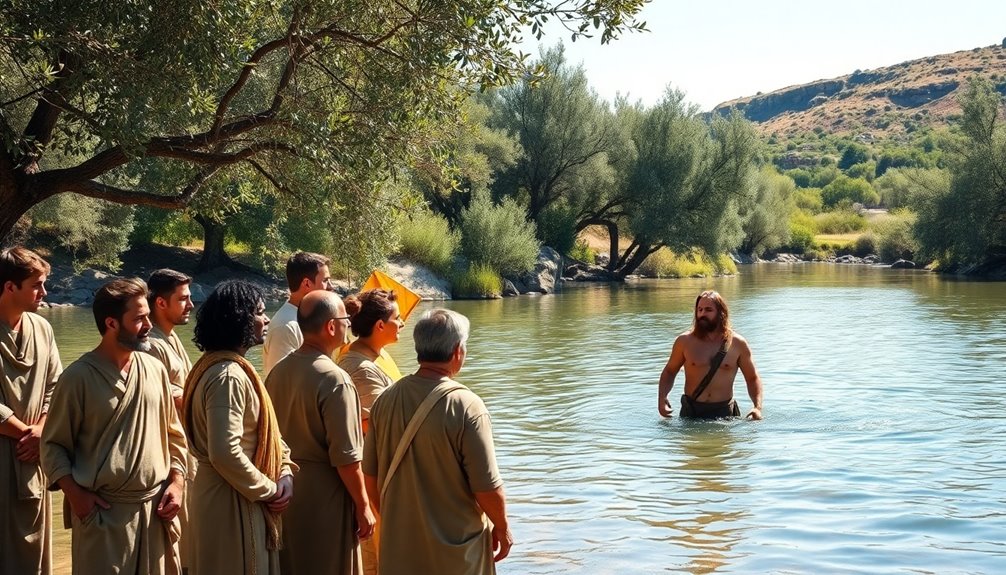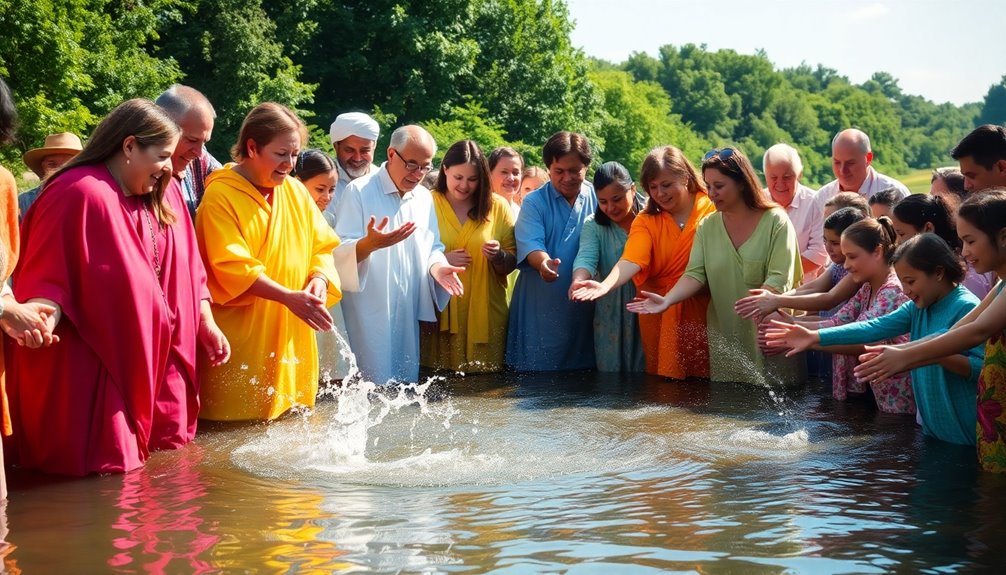Jesus was baptized to fulfill all righteousness and publicly declare His mission as the Messiah. This act marked the beginning of His public ministry and identified Him with humanity's sinfulness, despite His sinless nature. By being baptized, He connected with John the Baptist's call for repentance and honored the existing Jewish purification rituals. The event also revealed the unity of the Trinity, showcasing God the Father, Jesus the Son, and the Holy Spirit. Ultimately, His baptism sanctified the waters for future believers and signified a transformative moment in the journey of faith. There's much more to uncover about its significance.
Key Takeaways
- Jesus' baptism marked the beginning of His public ministry and fulfilled all righteousness as described in Matthew 3:15.
- It symbolized His identification with humanity's sinfulness, showcasing His role in God's redemptive mission.
- The event demonstrated the unity of the Trinity, with the Father, Son, and Holy Spirit present.
- Jesus' baptism sanctified the waters for future believers and foreshadowed His sacrificial death.
- It affirmed the importance of baptism in the community, linking Jesus to Jewish purification rituals and the new covenant.
Introduction

Baptism holds profound significance in the Christian faith, and Jesus' own baptism is a pivotal moment in the New Testament. When you look at this event, you see it's not just about water; it's about Jesus' mission and identity. He was baptized by John the Baptist in the River Jordan, marking the beginning of His public ministry.
Even though Jesus was sinless, He chose baptism to identify with humanity's sinfulness, demonstrating humility and a commitment to fulfill all righteousness. This act wasn't merely symbolic; it served as a public declaration of Jesus as the awaited Messiah.
As He emerged from the water, the heavens opened, and God's voice confirmed His divine role while the Holy Spirit descended like a dove. This moment foreshadows the importance of baptism for believers today, as it sanctifies the waters and unites them with Jesus in His mission for salvation.
Additionally, Jesus' baptism illustrates the unity of the Trinity, showcasing the collaborative roles of the Father, Son, and Holy Spirit in the act of baptism and the overarching plan of salvation.
Understanding this context enriches your appreciation of why Jesus was baptized.
Biblical Texts on Baptism

When you explore the biblical texts on baptism, you'll find key references that shape its significance in the Christian faith.
The accounts in the Gospels, particularly Matthew 3:13-17, provide a clear picture of Jesus' baptism and its implications.
Additionally, other scriptures further illustrate the role of baptism in the lives of believers, establishing it as a foundational practice.
Primary Bible References
You might be surprised to find that Jesus' baptism is a pivotal event documented across all four Gospels, each offering unique insights into its significance.
In Matthew 3:13-17, you see a detailed account where Jesus is baptized by John the Baptist. Here, Jesus explains His action as a means to "fulfill all righteousness," emphasizing His commitment to God's will and the plan of salvation.
Luke 3:21-22 captures the moment beautifully, highlighting the descent of the Holy Spirit upon Jesus, while God's voice affirms Him as His beloved Son. This divine approval marks the beginning of His ministry.
Mark 1:9-11 provides a succinct version, focusing on the immediate significance of the event and its role in launching Jesus' public life.
John's Gospel, although it refers to Jesus' baptism indirectly in 1:29-34, connects it to His mission by declaring Him the Lamb of God who takes away the sin of the world.
These primary references together illustrate not just the act of baptism but also its profound implications for righteousness and the Holy Spirit's anointing on Jesus.
Secondary Bible References
While many focus on Jesus' baptism as a singular event, secondary biblical references reveal its deeper significance and ongoing relevance in the Christian faith. John the Baptist's ministry emphasized a baptism of repentance, where people came to confess their sins and prepare for the coming Messiah (Matthew 3:6-7). This act wasn't merely symbolic; it illustrated the need for spiritual cleansing and readiness to embrace Christ.
In Acts 2:38, Peter encourages believers to "repent and be baptized," underlining baptism as an initiation into the community of faith.
Romans 6:3-4 further explains that through baptism, you share in Jesus' death and resurrection, marking a profound transformation in your identity.
Galatians 3:27 highlights that those who are baptized into Christ have clothed themselves with Him, showcasing the new life you embrace.
Moreover, 1 Peter 3:21 connects baptism to salvation, signifying more than just physical cleansing; it's a pledge of a good conscience toward God.
These secondary references illustrate that Jesus' baptism wasn't simply an act of obedience but a pivotal moment in the fulfillment of all righteousness, inviting all believers into a transformative relationship with Him.
First-Century Judean Baptism Practices

In first-century Judea, the practice of baptism served as both a ritual purification and a public declaration of faith, deeply rooted in the cultural and religious traditions of the time. People often immersed themselves in water, symbolizing a cleansing from sin and impurity.
This practice was closely linked to the teachings of John the Baptist, who preached repentance and the confession of sins as essential preparations for the coming Messiah.
You'd find that Jewish purification rituals, such as those involving immersion in a mikveh, emphasized the significance of physical cleanliness and spiritual renewal. Baptism wasn't just a private affair; it was a communal practice that marked entry into a new covenant relationship with God.
The baptism of Jesus by John represented a pivotal moment, affirming these practices and signaling the start of Jesus' public ministry.
Cultural Significance of Baptism

The cultural significance of baptism in first-century Judea went far beyond mere ritual; it was a powerful symbol of spiritual renewal and communal identity. This practice represented a transition for individuals seeking a deeper connection with God. John the Baptist played a crucial role, attracting large crowds with his message of repentance and preparing the way for the Messiah. His emphasis on purification through baptism highlighted the collective nature of this act, reinforcing the idea that everyone shares a need for renewal.
When Jesus chose to undergo baptism, He publicly affirmed His commitment to fulfilling God's will, showcasing the importance of obedience to divine authority. His sinlessness didn't negate the act; instead, it underscored a cultural practice that transcended individual guilt.
Baptism became a communal event, linking believers to the broader Jewish tradition of ritual washing. In this context, it not only served as a rite of passage but also solidified one's place within the community and their relationship with God's covenant.
Thus, baptism in Jesus' time was about more than just personal faith; it was an essential expression of shared beliefs and values within the Jewish cultural framework.
Baptism's Role in Repentance

You might think baptism is just a ritual, but it holds a much deeper purpose related to repentance.
Understanding this sacrament can help clear up misunderstandings about its significance and why it matters in your spiritual journey.
Let's explore how baptism invites a transformative shift in your life and faith.
Address Misunderstandings About Baptism
Why do many people mistakenly believe baptism is solely about repentance? It's an important question, especially when considering Jesus' baptism.
While John the Baptist focused on a ritual of repentance for the forgiveness of sins, Jesus didn't require this because He was sinless. His baptism wasn't about turning away from sin but served to fulfill all righteousness and publicly identify with humanity's need for salvation.
When Jesus chose to be baptized, He validated John's prophetic ministry and marked the beginning of His public life. This act illustrated His humility and willingness to embrace the human experience, setting a profound example for His followers.
Jesus' participation transformed the meaning of baptism for all future believers. Rather than simply a ritual of repentance, it became a symbol of the new covenant and a means of grace.
For you, baptism now represents a commitment to faith and a public declaration of your devotion. Understanding this shift helps clarify that baptism's role extends beyond just repentance; it embodies a deeper commitment to a life of faith.
Misinterpretation of Baptism's Purpose
In the context of Jesus' baptism, many people grapple with the notion that it was simply a ritual for repentance. Given Jesus' sinless nature, His participation in a baptism meant for the repentance of sins raises questions. John the Baptist called people to confess and turn away from their wrongdoings (Matthew 3:6-7), making Jesus' involvement seem paradoxical.
However, Jesus clarified His purpose by stating it was necessary to "fulfill all righteousness" (Matthew 3:15). This indicates that His baptism wasn't about personal repentance but was a crucial part of God's divine plan.
By being baptized, Jesus sanctified the waters for future believers, highlighting His identification with humanity and God's redemptive mission. Misinterpreting baptism as solely a ritual of repentance can overshadow its significance.
It marks the beginning of Jesus' ministry and foreshadows His ultimate sacrifice for humanity. Understanding baptism's true role helps us appreciate its transformative power, moving beyond mere ritual to a divine act that connects believers to Christ's mission.
Baptism as a Communal Experience

When you think about your own baptism, do you remember the sense of community that surrounded the experience?
It's not just a personal commitment; it's a shared journey with others who are also seeking spiritual renewal.
This communal aspect reinforces the idea that faith is best experienced together, as you all prepare for a deeper relationship with God.
Reflect on Personal Baptism Experience
Baptism isn't just a personal milestone; it's a vibrant communal event that brings together believers in celebration and support. When you stand before your community, declaring your faith, you experience a profound moment of transformation, not just for yourself but for those around you. The shared joy of your baptism fosters a sense of belonging, as your fellow believers witness your commitment to the faith.
During communal services, the congregation plays an essential role in this experience. They cheer you on, reinforcing the ties that bind you to the larger body of Christ. As you recount your personal testimony, you inspire others, reminding them of their own journeys of faith. This act of sharing not only deepens your connection with the community but also highlights the collective nature of faith.
Your baptism signifies your integration into this nurturing environment where mentorship and discipleship thrive. You're not just joining a church; you're becoming part of a supportive family that walks alongside you in your spiritual growth.
Baptism as Community Commitment
Through Jesus' baptism, the concept of communal commitment takes on profound significance. When He was baptized by John, it wasn't just a personal act; it was a public declaration of His dedication to fulfill all righteousness. This moment marked the start of His ministry, inviting others to recognize His divine mission within the community of faith.
Baptism serves as a powerful communal experience, symbolizing not just individual repentance but also the collective readiness for the Messiah. By participating in this ritual, Jesus emphasized the importance of community acceptance and accountability. He identified with the very people He sought to save, highlighting that faith isn't a solitary journey but a shared commitment.
His baptism set a precedent for His followers, demonstrating that communal rites are vital in affirming one's commitment to both the faith and the community. It rallied His disciples and the broader community to acknowledge His authority and mission.
In this way, Jesus' baptism underscores how vital it's to engage with others in our faith journey, fostering unity and a sense of belonging among believers.
Baptism's Transformative Communal Impact

Why does Jesus' baptism hold such significance for communities of faith? It's more than just a personal experience; it's a communal event that invites you and others into a transformative relationship with God.
Jesus' act of baptism didn't merely signify the start of His public ministry; it also established a new communal identity among believers. When you participate in baptism, you're engaging in a shared mission, embodying the values of the Kingdom of God within your community.
By sanctifying baptism, Jesus made it a foundational practice for His followers, marking entry into the faith community. This isn't just an individual commitment; it's a collective one. The moment of His baptism, where the Father affirmed Him and the Holy Spirit descended, reflects a divine approval that encourages communal worship.
The early church embraced this transformative impact, as seen in Acts 2:38-41, where thousands were baptized together. This emphasizes the importance of community in faith practices.
Through baptism, you're not only declaring your faith but also reinforcing a collective commitment to Christ and the communal journey of believers, fostering a sense of belonging and unity.
Additional Resources

For those looking to deepen their understanding of Jesus' baptism and its significance, a variety of resources are available that explore both theological perspectives and practical applications.
You might start with the Gospel of Matthew, specifically chapter 3, which details how Jesus came to be baptized to "fulfill all righteousness." This act was pivotal, as it marked the beginning of Jesus' public ministry and His identification with fallen humanity.
Books on Christology often dive deeper into the implications of this event, shedding light on how Jesus' humility in being baptized highlights His willingness to associate with sinners.
Consider exploring works by theologians who discuss the Trinitarian revelation during His baptism, where the Holy Spirit descends and the Father acknowledges His Sonship.
Additionally, resources that focus on the sacramental nature of baptism can enrich your understanding of how this event sanctified the waters for future believers.
Online courses, podcasts, and lectures can also provide engaging insights into the broader theological context, helping you appreciate how Jesus' baptism not only fulfilled God's will but established a transformative ritual for Christians today.
Frequently Asked Questions
What Are Two Reasons Why Jesus Was Baptized?
When considering why Jesus was baptized, you can see two key reasons.
First, He wanted to fulfill all righteousness, showing His commitment to God's will.
Second, His baptism marked the start of His public ministry, symbolizing His connection to humanity's need for repentance.
Why Did Jesus Want Us to Be Baptized?
Jesus wanted you to be baptized to demonstrate your commitment to God and His teachings.
It's a public declaration of your faith, showing that you identify with Jesus' death and resurrection.
By participating in baptism, you join a community of believers and affirm your desire to live a righteous life.
This act also transforms the waters of baptism into a means of grace, marking your entry into a new spiritual journey.
What Are the Three Purposes of Jesus' Baptism?
Jesus' baptism had three main purposes.
First, it fulfilled God's righteousness, showing His commitment to divine will.
Second, it established His identification with humanity, despite being sinless, emphasizing His role as the Suffering Servant.
Finally, it marked the beginning of His public ministry, with the Holy Spirit's descent symbolizing divine approval and empowerment.
Understanding these purposes can deepen your appreciation for the significance of baptism in your own faith journey.
Why Did Jesus Ask for Baptism From John if It Is Meant Only for Sinners?
You might wonder why Jesus sought baptism from John when it was intended for sinners.
By doing so, Jesus identified with humanity, showing solidarity with those needing repentance. His baptism wasn't for His own sins, since He was sinless, but to fulfill God's plan and validate John's ministry.
This act marked the beginning of His public ministry and demonstrated the importance of repentance, setting a powerful example for all His followers.










